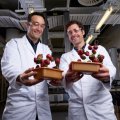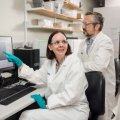When Rachael Melville graduates in medicine from the University of Queensland on December 5, she would like to thank a few people, including her family, her school guidance officer and administrators of the University's UQ-Link program.
One of seven children, Sydney-born Ms Melville wanted to be a doctor, but didn't know anyone in Brisbane for support. Family financial circumstances made the prospect of studying and living in Brisbane almost impossible.
She had worked hard at school, her tertiary entrance score was excellent, but it was a whisker short for entry to medicine.
Fortunately, the guidance officer at Townsville State High School, Lurlene Christie, had heard of a relatively new program at the University of Queensland called UQ-Link. She spoke to its administrator and the current University Courses and Admissions manager Maureen Bowen, about a student who would just shine, given the chance.
UQ-Link, the first scheme of its kind in Queensland, is a University equity initiative to encourage bright students from socio-economically disadvantaged backgrounds to continue their formal education through study at the University.
Ms Christie applied for Ms Melville's entry to the program, and for one of a limited number of residential scholarships available through the scheme. The Dean of Medicine also agreed she should be given a chance to do the course.
This year their faith has been rewarded. Ms Melville is one of 80 UQ-Link students expected to graduate in December, including seven medical doctors, one PhD, four pharmacists, two dentists, four engineers and three veterinary scientists.
Her parents Stuart and Jan Pattison of Rasmussen, Townsville will represent the family to cheer as she walks across the Mayne Hall stage, but while other medical graduates will holiday before commencing internships next year, Ms Melville begins a one-year internship at Caboolture Hospital three days later. Her ultimate goal is to work in the Morayfield area as a general practitioner.
Currently based at Redcliffe Hospital, Ms Melville has worked a double shift for the past four years to realise her dream. As well as studying and working in hospitals as a medical student, she also works four nights a week at a Caboolture restaurant to support herself through her studies.
UQ-Link was established in 1989 as a pilot project, with 15 schools invited to participate in the initial program. Originally funded under DEET's High Education Equity Program initiative, the University took over total funding in 1991, and confirmed its position as a continuing university activity.
Today the program is supported both from mainstream University funds and by donations to the University's Annual Appeal and from the Alumni Association.
Two hundred and nine UQ-Link students have graduated since 1992, and currently 308 undergraduate students and 33 postgraduate students are enrolled in semester two at the University.
UQ-Link includes activities such as a school-based tertiary awareness phase, a special entry facility (approximately 100 places available each year) and a university support phase to assist students once they are admitted. The school phase and special entry aspects of UQ-Link are managed by the University's Courses and Admissions, while Student Support Services are responsible for the university phase.
'Through UQ-Link, we aim to make students more aware of the potential benefits of tertiary education,' University Deputy Manager Courses and Admissions Claron Driscoll said.
'It isn't a charity. Students who have had their academic progress limited by socio-economic factors are just given the chance to achieve their full potential.
'It is one of two special admissions programs offered by the University to increase the participation rates of target communities so the University's student population reflects that of the general community.'
Ms Driscoll said special entry consideration was available for all University of Queensland undergraduate courses, including those at its Gatton College campus.
While UQ-Link applicants can gain entry to courses with OPs lower than the usual cut-off score, many students have gained admission to the University on their own academic merit.
The program currently targets 79 schools, selected using University participation rates and socio-economic data. However, information about the program is sent to all secondary schools in Queensland and northern New South Wales, as students from socio-economically disadvantaged backgrounds can attend a variety of schools.
'UQ-Link was great,' Ms Melville said.
'They introduced us to the University before Orientation. We got to know people in Brisbane, and there was a support group of peers to whom we could go with any problems. Before O-Week had even started, people had shown us how to use Brisbane transport and get around Uni.'
Assistance offered through the program also includes peer-assisted study sessions (PASS), peer support from second, third and fourth year UQ-Link students, personal counsellor support, free computer access, additional tutorial support, and emergency assistance grants.
Ms Melville was grateful for the social support provided by other UQ-Link students, who held social functions and provided a barrier against loneliness. To return the favour, she was a founding member of the Linkers Club and was president for 12 months in 1992.
Ms Driscoll said nominations for inclusion in UQ-Link could be made only through schools.
All students recommended for special entry still had to apply through the Queensland Tertiary Admission Centre for a place at the University. Schools not included in the school phase of UQ-Link were also invited to recommend students for special entry consideration.
UQ-Link offers will be made mid-January along with the QTAC major round offers.
For further information, contact Ms Driscoll (telephone 07 3365 3393; fax 07 3365 1794).
.jpg)



